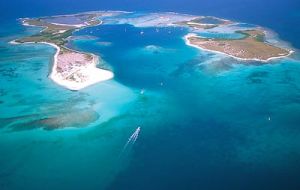MercoPress. South Atlantic News Agency
German Scientists Discover non Chartered Sunken Islands in the Caribbean

German scientists announced on Monday they believe they have discovered sunken islands in the Caribbean Sea following a deep sea expedition in April.
During their six weeks in the waters north of Venezuela and west of the Antilles, the experts from the University of Greifswald analyzed rock samples from depths of more than 1,000 meters. The area is known for the Hess-Escarpment and extends as a linear underwater cliff for 620 miles.
The Meteor research vessel crew used echo sounding to measure the ocean floor, an exercise which revealed significant differences in depth compared to current marine charts. In fact, some of the underwater mountains listed on charts did not exist at all, while other areas thought to be flat showed rises of up to 1,000 meters, geologist Martin Meschede said.
The team's biggest surprise came from the samples they dredged from the ocean floor, which showed stones that could only have come from very shallow depths. “We found remnants of coral, snails and algae that are only found in the light-flooded upper level of the sea,” Meschede said.
As a result of their findings, the scientists believe that the submarine mountains, whose summits now top out at between 800 and 1,000 meters below the surface, were volcanic islands in the Caribbean Sea some 40 to 50 million years ago.
The Greifswald group hypothesizes that they were part of a reef that grew on a basalt platform and sank during a seismic event in the ocean’s crust. The German scientific team also used an underwater robot called ROV Kiel 6,000 to collect samples from the underwater mountain range.




Top Comments
Disclaimer & comment rulesCommenting for this story is now closed.
If you have a Facebook account, become a fan and comment on our Facebook Page!